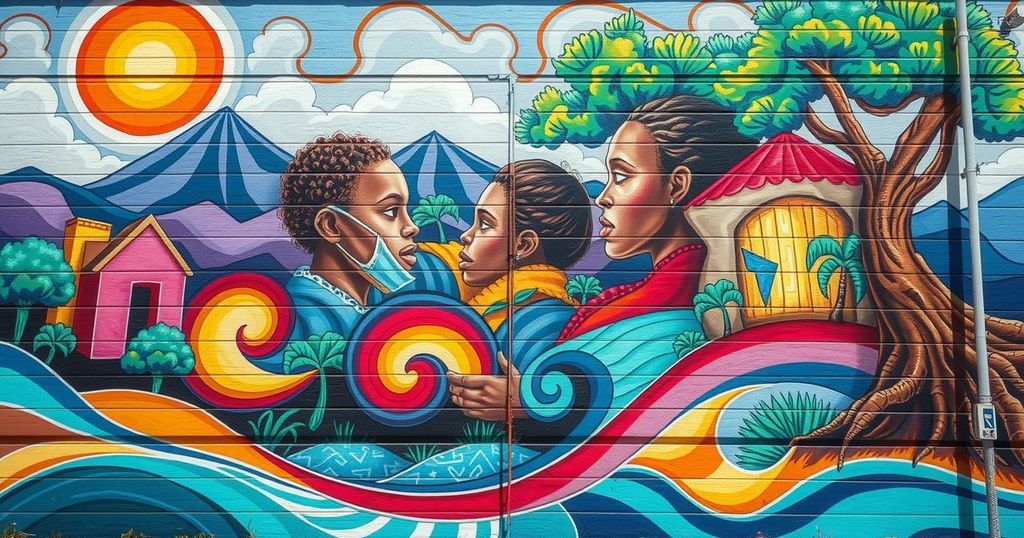South Africa’s Gang Warfare: Victims Caught in the Crossfire in Cape Town

Cape Town’s gang violence continues to claim innocent lives, including that of four-year-old Davin Africa, highlighting a tragic cycle rooted in history. Families, like Davin’s, struggle with immense loss and trauma. Government initiatives have not curbed the violence as gang culture thrives. Community leaders, such as Pastor Craven Engel, work tirelessly to mediate conflicts and promote peace, every day battling the pervasive grip of drugs, crime, and longstanding generational issues. Amid despair, there are glimmers of hope as some, like Fernando Johnston, attempt to break free from these lethal patterns.
In Cape Town, the scars of gang violence run deep, leaving numerous families shattered and disrupted. The heartbreaking fate of four-year-old Davin Africa, who was tragically shot during a gang shootout in February, paints a grim picture of life in the Cape Flats. His father, Devon, pointed to two bullet holes in their wall, stark reminders of their loss. This family has borne unspeakable grief—Davin’s older sister, Kelly Amber, was murdered two years prior, also a victim of gang-related violence.
Davin’s parents are left grappling with the reality that they now only have their youngest daughter. “She asks me: ‘Where’s my brother?'” shared Undean, his mother. Their home in Wesbank is emblematic of a larger crisis; many families across the Cape Flats have faced similar tragedies, despite government assurances of increased police presence.
Statistics indicate that the Western Cape province consistently records the majority of gang-related murders in South Africa. Although President Cyril Ramaphosa established a special unit in 2018 to fight gang crime and even deployed the army briefly, the situation remains dire, with violence persisting. Gareth Newham, head of the Justice and Violence Prevention programme at the Institute for Security Studies, emphasizes the entrenchment of gangs in the community, stating they often fulfill roles left vacant by an under-resourced state.
The depth of this crisis is further highlighted by Pastor Craven Engel, who operates 15 kilometers away in Hanover Park. Engel tirelessly mediates gang disputes in hopes of staving off further violence amid a drug-fueled economy. He lamented that the conditions in the area stem from deep historical roots, including apartheid’s legacy and ongoing generational trauma leading to rampant drug abuse and family breakdowns.
Engel indicates that the local economy largely hinges on the drug trade, creating a relentless cycle of violence. The situation is alarmingly precarious, with youth frequently becoming both perpetrators and victims. Newham observed the difficulties in policing, noting that even when gang members are arrested, they are swiftly replaced by younger individuals, perpetuating the cycle of violence.
As violence rages on, Engel remains committed to community outreach. His efforts include fostering relationships with gang leaders and victims alike to foster understanding and peace. Despite inherent dangers, he continues to meet with those involved in gang life, even as he seeks to broker peace agreements amid threats from gang members.
The challenges of negotiating a ceasefire are evident; one gang member ominously expressed that seizing territory through violence leads to power. Engel, however, continues to push for non-violent resolutions, often drawing on rehabilitated gang members to reach out to active factions.
Amid these dark realities, individuals like Fernando Johnston, part of the Mongrels gang, seek to break free from the cycle of violence with Engel’s help. Johnston, aware of the grim paths available—either imprisonment or death—has opted for rehabilitation, a program Engel runs to help those ensnared by drugs and violence find legitimate paths forward.
As Johnston embarks on this path, his mother emphasizes her hope for him, reflecting on the difficulties of raising a family amid violence. Two weeks into the program, Johnston shows signs of stability and is working towards a more positive future.
Yet, over in Wesbank, the Africa family’s life continues to unravel under the weight of continual violence. With the psychological toll of living in a war zone, residents find themselves trapped between the gangs and a police force they do not trust. The sense of helplessness grows as Pastor Engel poignantly states, “Nobody is going to come from anywhere to help or save us… politics has clearly failed us.”
The story in Cape Town is about more than just statistics; it is a deeply human tragedy affecting countless families. As the community grapples with these ongoing issues, the resilience of individuals like Pastor Engel and those seeking change offers a glimmer of hope against the odds.
The persistent gang violence in Cape Town, particularly in the Cape Flats, has devastated families and claimed innocent lives, as illustrated by the tragic experiences of the Africa family. Despite government efforts, the cycle of violence continues unabated, highlighting the grim reality many residents face. Yet, amidst this turmoil, community leaders and individuals are working tirelessly for peace, demonstrating resilience in the face of profound challenges. The road to recovery is fraught with difficulties, yet hopeful narratives, like that of Fernando Johnston, illuminate the possibility of change and rehabilitation, even in the most desperate of circumstances.
Original Source: www.bbc.com







